Pipina Katsari, Kinshasa, Democratic Republic of Congo
“What keeps impressing me is the desire of refugee parents and children to receive meaningful education and decent employment the soonest possible.”
World Humanitarian Day 2023: stories from the field
How would you describe your work?
I began my journey with UNHCR in Greece, my home country, back in 2015, on the beautiful island of Samos, working in the protection field. Over the years, I progressed to become the Head of the Field Office there in 2018. On Samos, our team was dedicated to providing life-saving assistance to people crossing the sea to seek safety. We also supported the capacity building of state authorities and worked together with refugees to help them rebuild their lives.
In early 2022, I was deployed on an emergency three-month mission to N’Djamena, Chad, where we focused on assisting and improving the living conditions for approximately 80,000 Cameroonian refugees.
Later the same year, I left Samos to join UNHCR’s Operation in the Democratic Republic of the Congo (DRC). I now work in the capital, Kinshasa, leading a team that endeavours to find a new home in a third country for refugees located in DRC. This involves working closely with refugees from neighbouring countries, including vulnerable people, such as survivors of violence and torture, who cοuld rebuild their lives in a third country that can cater to their specific needs or maximise their talents and potential.
Unfortunately, resettlement is still an exceptional solution serving less than 1% of the world’s refugees, while programmes for safe complementary pathways, such as employment and education opportunities, remain limited. Thus, many people still find themselves compelled to embark on perilous journeys in search of safety and opportunities.
What made you decide to become a humanitarian worker?
I grew up changing regularly home with my family, moving inside Greece, but also to the USA and Belgium, due to the profession of my father, who is now a retired General. I understood early on that if we take the time with an open mind to get to know a person, even from a very different background, we can find meaningful common interests and dreams. We have the chance to give, take, and create beautiful new things together.
I began my career focusing on war crimes and how to rebuild justice systems after devastation seen in Kosovo, Bosnia and Herzegovina, Georgia, Libya, Armenia, DRC, and elsewhere. Having “been there” on the ground, has been an eye-opening experience. It also compelled me to try to understand the world around me and the inevitable close interconnection of our societies. I am inspired by people who try to rebuild their homelands after war, but also by the resilience of people forced to flee their precious nests, who start their lives anew contributing with their capabilities to their new homes. I feel I can help make a difference for respectful and strong societies in our world, by contributing to joint efforts that bring refugees and host communities together and allow every person to bring out the best in themselves and in each other. This way I can also express my gratitude for those dynamics and people that have shaped me as a person.

Pipina (right) discusses with refugee women about the particular challenges the latter face, at Biringi refugee settlement during a distribution, Ituri province, Democratic Republic of the Congo. © Tania Manduanga
Which is the greatest challenge you have faced working far from Greece?
Whenever I land in Greece, just after kissing my family, I seek to indulge in a traditional “pita gyros”. Going to the sea and enjoying fresh fish at a taverna, listening to Greek music and dancing with family and friends, is the next priority. All these small pleasures in life that one misses when working far from home!
But among the greatest challenges of working in conflict and post-conflict environments and in areas where extreme poverty and poor infrastructure are prevalent, are the problems related to access to water, electricity, internet, and security. While adaptability kicks in very soon, life and work can become very challenging when you miss “things” that are often taken for granted in Greece and other places. These situations help us appreciate what we have, but also prompt us to better prepare, think out of the box, and admire the resourcefulness of locals and how they overcome hardships.
Please describe an experience you had working in the field, that you will never forget.
Working in the field has provided me with countless unforgettable experiences, so it is very hard to isolate one. However, what has made particular impression on me is the desire of refugee parents and children to receive meaningful education and decent employment the soonest possible.
I cannot forget an Afghan father with three daughters who had just landed on Samos island. Τhey were sitting on the damp floor of the former camp waiting to be registered. While they expected they would be sleeping in the woods due to the overcrowded conditions in the camp at the time, the only question of the father was how soon his daughters could be enrolled in school. In Chad, I recall walking in the camp of Kalambari and being followed around by children. When I told them that I came from Greece, an 11-year-old Cameroonian boy told me that he knew the story of the Minotaur. We sat together and enacted the story of Theseus and the Minotaur for the other kids. I was humbled by that boy who came from the extreme northern part of Cameroon and was aware of Greek mythology, while I knew so little about his country’s stories.
More recently, in DRC, we were excited to arrange the departure of a 15-year-old girl, refugee from the Central African Republic, for her resettlement to Finland. The girl’s parents had died by the time she was six, while she survived repeated sexual abuse. When I met her just before her travel to Finland, her first question was how soon she would start going to school there. Her dream for the future was to study law and become a humanitarian like the women in our team.
What does solidarity mean to you and how could we foster it further?
Solidarity for me is the Head of Kalambari village in Chad, who would walk daily across a camp hosting more than 10,000 refugees, located just a few meters away from locals’ homes. While he must have had concerns about this co-existence, during his walks he was interested to get to know the refugees, address any problems and find ways to create opportunities for both the local community and the newcomers. This image echoes the countless examples of solidarity with refugees that I have seen throughout my career with UNHCR.

Τhe Head of Kalambari village in Chad, Mr. Abakourama, with a Cup of Pythagoras, a clever vessel credited to Pythagoras of Samos, which empties when overfilled, due to design, teaching the value of moderation and self-control.
Page 2 of 3
-

Scoring a “goal” in inclusion: Naser’s journey to adulthood through football
30 May 2024The Municipal Stadium of Galatsi buzzes with the energetic voices of young boys training with the “Niki Galatsiou” football team. Among them is Naser, a forward who counterattacks, dribbles past defenders and scores. “Scoring on the field makes me feel really good. Football is an immense, indescribable love for me”, […]
-

“We are all together in the race for life”
24 May 2024UNHCR announces winners of National Student Contest on the power of sports
-

Refugee integration: How refugees can help businesses grow
16 May 2024Joint press release
-
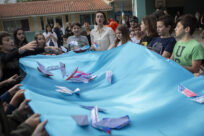
“Together!” student art festivals present in cities around Greece the world as children want it to be
29 Mar 2024Joint Press Release UNHCR/TENet
-

A young boy with big dreams: Matin’s journey from unaccompanied minor to aspiring doctor
22 Mar 2024“My name is Matin. I am from Bamyan, Afghanistan. And I have dreamt of becoming a doctor for as long as I can remember.”. In the heart of Mytilene, against the backdrop of the blue sea and radiant sun, 19-year-old Matin shares his aspiration of becoming a doctor and speaks […]
-

A taste of inclusion: Refugee women build a better future through cooking
7 Mar 2024The stress levels are high in the professionally designed kitchen of the non-profit organization “Odyssea”, as Charity, Endurance and Anastasia prepare the ingredients to cook chicken in red sauce. This is the last day of the “Kitchen Assistant” course they are attending, and their goal is to pass the cooking […]
-
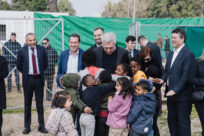
Filippo Grandi: We are still at the beginning of the road
26 Feb 2024Interview of the UN High Commissioner for Refugees Filippo Grandi to Kathimerini newspaper
-
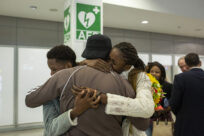
Refugee family reunites and finds hope after many years of separation
21 Dec 2023Barly waits anxiously in the arrivals hall of Athens International Airport “Eleftherios Venizelos”. He holds a colourful bouquet of flowers to offer to his wife, Rachel, and their four children. They will soon meet each other again after eight years of separation. Barly’s family is traveling from their homeland, the […]
-
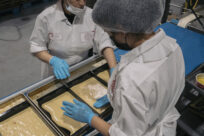
UNHCR and IOM welcome new amendment facilitating access to labour for migrants and asylum-seekers
19 Dec 2023UNHCR, the UN Refugee Agency, and IOM, the International Organization for Migration, welcome the amendment that was voted in Parliament today and includes key provisions facilitating legal employment for migrants and asylum-seekers in Greece. Key aspects of the amendment involve the issuance of a three-year residence permit for foreign nationals […]
-
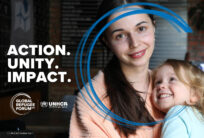
Global Refugee Forum: A moment of unity
14 Dec 2023The Global Refugee Forum, the world’s largest gathering on refugees, opened yesterday in Geneva. It is a moment of unity and action. A moment to demonstrate our collective will to find solutions to the challenges posed by record levels of forced displacement. According to UNHCR’s latest estimates, there are 36 […]
